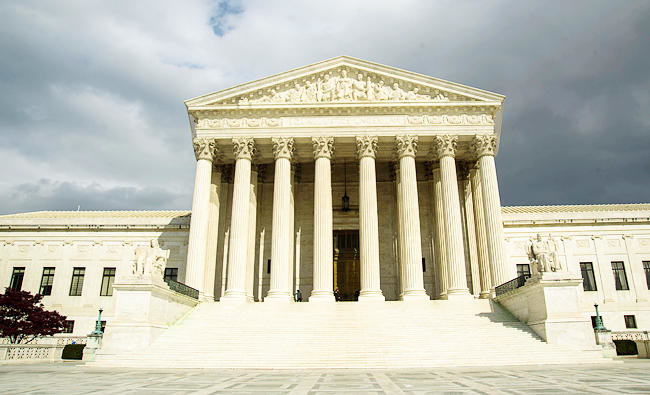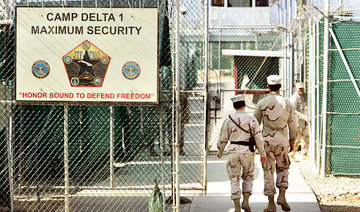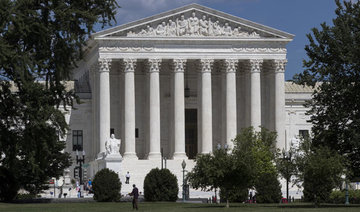WASHINGTON: The White House asked the US Supreme Court on Monday to allow President Donald Trump’s latest travel ban to take full effect after an appeals court in California ruled last week that only parts of it could be enacted.
A three-judge panel of the San Francisco-based 9th US Circuit Court of Appeals on Nov. 13 partially granted a Trump administration request to block at least temporarily a judge’s ruling that had put the new ban on hold. It ruled the government could bar entry of people from six Muslim-majority countries with no connections to the United States.
Trump’s ban was announced on Sept. 24 and replaced two previous versions that had been impeded by federal courts.
The administration’s appeal to the top US court argued that the latest travel ban differed from the previous orders “both in process and in substance” and that the differences showed it “is based on national-security and foreign-affairs objectives, not religious animus.”
It also argued that even if the 9th Circuit ruled to uphold the partial ban, the Supreme Court was likely to overturn that decision as it had “the last time courts barred the President from enforcing entry restrictions on certain foreign nationals in the interest of national security.”
Last week’s appeals court ruling meant the ban would only apply to people from Iran, Libya, Syria, Yemen, Somalia and Chad who did not have connections to the United States.
Those connections are defined as family relationships and “formal, documented” relationships with US-based entities such as universities and resettlement agencies. Those with family relationships that would allow entry include grandparents, grandchildren, brothers-in-law, sisters-in-law, aunts, uncles, nieces, nephews and cousins of people in the United States.
The state of Hawaii, which sued to block the restrictions, argued that federal immigration law did not give Trump the authority to impose them on six of those countries. The lawsuit did not challenge restrictions toward people from the two other countries listed in Trump’s ban, North Korea and Venezuela.
US District Judge Derrick Watson in Honolulu ruled last month that Hawaii was likely to succeed with its argument.
Trump issued his first travel ban targeting several Muslim-majority countries in January, just a week after he took office, and then issued a revised one after the first was blocked by the courts. The second one expired in September after a long court fight and was replaced with another revised version.
Trump has said the travel ban is needed to protect the United States from attacks by Islamist militants. As a candidate, Trump promised “a total and complete shutdown of Muslims entering the United States.”
Critics of the travel ban in its various iterations call it a “Muslim ban” that violates the US Constitution by discriminating on the basis of religion.
The 9th Circuit is due to hear oral arguments in the case on Dec. 6. In a parallel case from Maryland, a judge also ruled against the Trump administration and partially blocked the ban from going into effect.
An appeal in the Maryland case is being heard on Dec. 8 by the 4th US Circuit Court of Appeals in Richmond, Virginia. The Maryland case was brought by the American Civil Liberties Union, which represents several advocacy groups, including the International Refugee Assistance Project.
White House asks US Supreme Court to allow full travel ban
White House asks US Supreme Court to allow full travel ban

’Albania belongs in EU,’ von der Leyen tells re-elected PM Rama

- EU and French leaders congratulated Albanian Prime Minister Edi Rama Wednesday after his party’s electoral victory
“Let’s keep working closely together on EU reforms. Albania belongs in the EU!” von der Leyen said on X. French President Emmanuel Macron also hailed Rama’s win, writing on X: “France will always stand alongside Albania on its European path.”
Germany arrests three Ukrainians suspected of spying in exploding parcel plot

BERLIN: Germany has arrested three Ukrainian nationals on suspicion of foreign agent activity linked to the shipment of parcels containing explosive devices, prosecutors said on Wednesday.
The suspects are believed to have been in contact with individuals working for Russian state institutions, federal prosecutors said in a statement.
France says to expel Algerian diplomats in tit-for-tat move

PARIS: France will expel Algerian diplomats in response to plans by Algiers to send more French officials home, Foreign Minister Jean-Noel Barrot said Wednesday, as relations between the countries deteriorate.
Barrot told the BFMTV broadcaster that he would summon Algeria’s charge d’affaires to inform him of the decision that he said was “perfectly proportionate at this point” to the Algerian move, which he called “unjustified and unjustifiable.”
Japanese military training plane crashes with two on board

TOKYO: A Japanese military training plane crashed shortly after takeoff, authorities said Wednesday, with reports saying two people were on board the aircraft which appeared to have fallen in a lake.
“We’re aware a T-4 plane that belongs to the Air Self-Defense Force fell down immediately after taking off at Komaki Air Base” in central Japan, top government spokesman Yoshimasa Hayashi said.
“Details are being probed by the defense ministry,” he told reporters.
The T-4 seats two and is a “domestically produced, highly reliable and maintainable training aircraft... used for all basic flight courses,” according to the defense ministry website.
The aircraft was flying around Lake Iruka near Inuyama city north of Nagoya, according to media outlets including public broadcaster NHK.
“There is no sight of the plane yet. We’ve been told that an aerial survey by an Aichi region helicopter found a spot where oil was floating on the surface of the lake,” local fire department official Hajjime Nakamura told AFP.
He said his office had received unconfirmed information that there were two people on board but that they had not been able to independently verify this.
Aerial footage of the lake broadcast by NHK showed an oil sheen on its surface, dotted with what appeared to be various pieces of debris.
Just after 3:00 p.m. (0600 GMT) the local fire department received a call saying it appeared that a plane had crashed into the lake, the reports said.
The reports added, citing defense ministry sources, that the training plane had disappeared from the radar.
The defense ministry was not able to immediately confirm details to AFP.
Jiji Press said the local municipality had said there had been no damage to houses in the area.
Kabul says ready for ‘dialogue’ with US on Afghan refugees

- Over 11,000 Afghans in the US risk deportation after losing temporary protected status this month
- Many of them backed the US during the 20-year war in Afghanistan and fled in fear of the Taliban
KABUL: The Taliban government said Tuesday it was ready for “dialogue” with the Trump administration on the repatriation of Afghan refugees whose legal protections in the United States will be revoked in July.
Citing an improved security situation in Afghanistan, Washington announced Monday that the temporary protected status (TPS) designation for Afghanistan would expire on May 20 and the termination would take effect on July 12.
Kabul is “ready to engage in constructive dialogue with the US & other countries regarding repatriation of Afghans who no longer meet criteria to remain in host countries,” said Abdul Qahar Balkhi, spokesman for the Ministry of Foreign Affairs, on X.
The Taliban government has already offered assurances that those Afghans who fled the country as they stormed back to power in 2021 could safely return.
However, the United Nations has reported cases of executions and disappearances.
Taliban authorities have also squeezed women out of education, jobs and public life since 2021, creating what the UN has called “gender apartheid.”
The move by Washington could affect more than 11,000 Afghans, many of whom supported the United States during two decades of war and fled Taliban persecution, according to Shawn VanDiver, president of AfghanEvac.
“Afghanistan is the shared home of all Afghans, & all have the right to free movement,” Balkhi said in his statement.
The country has faced a major economic crisis since 2021 and is enduring the second worst humanitarian crisis in the world after Sudan, according to the United Nations.
More than 100,000 Afghans have returned home since neighboring Pakistan launched a new mass expulsion campaign in April.
More than 265,000 undocumented Afghans also returned from neighboring Iran between January and April, according to the International Organization for Migration (IOM).
US federal law permits the government to grant TPS to foreign citizens who cannot safely return home because of war, natural disasters or other “extraordinary” conditions.
But since taking office President Donald Trump has moved to strip the designation from citizens of countries including Haiti and Venezuela as part of his broader crackdown on immigration.
















